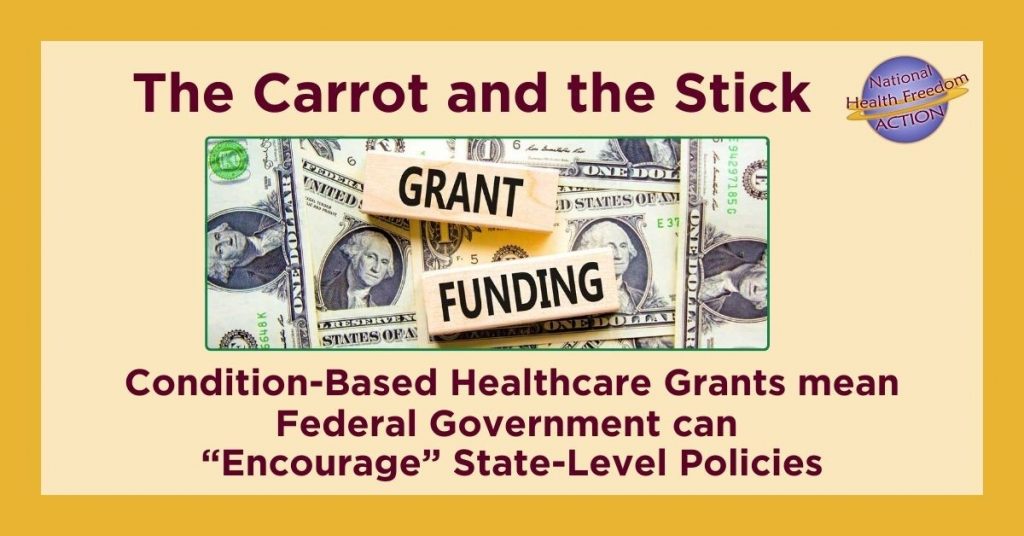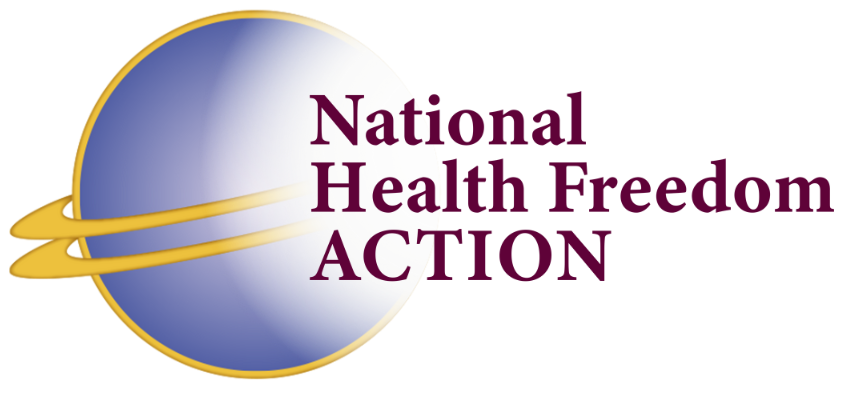
The Carrot and the Stick: Condition-Based Healthcare Grants mean Federal Government can “Encourage” State-Level Policies

We are usually aware when the government attempts to bluntly use a “stick” to mandate citizen behavior and actions. But did you know that government also uses the “carrot;” e.g., money for healthcare issues can be made available on condition that a state or other entity take specific actions desired by the federal government? The US Constitution gives authority to offer federal grants to states or localities with “strings,” or conditions, attached based on the Constitution’s Spending Clause, within certain parameters.
Two federal health agencies award billions in grants
The Center for Disease Control and Prevention (CDC) and the Health Resources and Services Administration (HRSA) are both sub-agencies of the US Department of Health and Human Services. In fiscal year 2019, 58% of CDC’s $5.652 billion in grants went to government entities including state and local governments. In fiscal year 2023, the HRSA agency awarded more than $13.1 billion in grants for its health-related programs.
States turn down money for COVID-19 testing and more
Back in November, 2021, Reuters weighed in on states that were rejecting COVID-19 funds. In one example, Idaho lawmakers turned down $40 million in federal money for COVID-19 testing at schools. Some legislators called the funds “overreach and reckless spending,” and others feel that such school-level testing is both disruptive and unnecessary. And Idaho was among twenty-six states which terminated federally funded unemployment insurance benefits prior to their expiration in September 2021. Governor Brad Little argued that the funds were a disincentive for people to get back to work. According to Reuters, Iowa also turned down federal money for school-based COVID-19 testing, and New Hampshire rejected funds for vaccinations.
Florida and Tennessee reject federal money for Medicaid expansion and HIV treatment
According to the Orlando Sentinel from January 2024, Florida’s governor Ron DeSantis has rejected $11 billion of federal healthcare funding over the last few years because there were strings attached, including Medicaid expansion. In October 2023 the AP reported on Republican efforts to reject federal funding in Tennessee; lawmakers are concerned about grant money requiring action on such things as, “abortion access and other hot-button issues.”
Clash of philosophies?
Tennessee is now among ten states which have long refused to expand Medicaid to thousands of low-income residents, including many who cannot afford health coverage. House Speaker Sexton offered that, “We should do everything that we can to be autonomous and independent from the federal government—-When you take federal government money, their philosophies and what they want you to do is different than probably what the state wants to do.”
DHHS demands funding be used for sex change operations
In a report from May 16, 2024 it is noted that conservative groups are up in arms after DHHS Secretary Xavier Becerra threatened to withhold federal money from hospitals that don’t perform “gender affirming” procedures based on religious grounds. Rep. Mary Miller, Ill., argued with Becerra last Wednesday, seeking his commitment to allow funds to go to facilities, “that refuse to provide the gender-affirming care that you’re mandating if it violates their religious beliefs.”
Pressed on this issue, Becerra offered that, “If a health care facility is violating the law and not providing the service they’re required to, they are not entitled to the resources.” Katy Talento of the Alliance of Health Care Sharing Ministries and former Trump administration health adviser, noted the DHHS rule at issue would coerce hospitals to provide so-called gender-affirming surgeries “or else lose access to federal funding to care for the poor and elderly, such as Medicaid and Medicare.”
Condition-based grants at the state level
“Strings” are also an issue with state and local grants, although the legal limits on the federal government’s authority do not apply to these entities. For example, in 2022 it was reported that the state of North Carolina had made $2 million available for county sheriffs to begin or expand jail-based treatment programs for opioid addiction. This money came with conditions: sheriffs were only allowed to use one of three approved medications, Vivitrol, which experts argued is less effective, and carries more hazards, than the other two FDA-approved products. Notably, Vivitrol is made by the pharmaceutical firm Alkermes, and this firm spent $4 million on federal lobbying in the last ten years and $370,000 on lobbying in North Carolina in the last six years.
Federal Grant conditions may not violate the Constitution
Turning back to the Constitutional issues, conditions attached to federal funds have to:
1) be clearly established, so recipients can make a knowing decision to accept or decline the money;
2) be “germane” to a federal interest in the programs that the funds are aimed at;
3) not violate other constitutional provisions, e.g. the First Amendment, Due Process, or the Takings Clauses within the Fifth Amendment; and
4) not cross the line from enticement to coercion.
“Commandeering” versus encouragement
The last criteria are meant to assure that conditions on federal funds do not violate the Tenth Amendment’s ban on “commandeering” state and local governments or officials by making them carry out federal programs. The high court has noted that in some circumstances, “the financial inducements offered by Congress might be so coercive as to pass the point at which ‘pressure turns into compulsion,’” making attached conditions unlawful. E.g., when the Congress withheld 5% of highway funds to states with a drinking age under twenty-one, the Supreme Court ruled that this was a “relatively mild encouragement.”
“Economic dragooning”?
In one example, as to the Affordable Care Act, the Supreme Court rejected the Act’s mandate to expand Medicaid dramatically since, “it involved the [threat of] withdrawal of all existing Medicaid funds.” Per the court, if the funding of an existing program is made conditional on adopting a new program, this is coercive if the money is a “significant portion” of a given state’s budget. In that case, Justice Roberts noted that the funds at issue were 10% of an average state’s budget and so represented a “gun to the head” and an, “economic dragooning that leaves the States with no real option but to acquiesce in the Medicaid expansion.”
State v. federal powers
As we can see, money, especially from the federal government, can come with a myriad of “strings” or policy requirements. So, states and localities must be careful when accepting such funds if they wish to maintain their independence and state-level priorities.
RECENT NEWS


EPA Deregulation of Clean Air and Water: does it go too far?
February 19, 2026


Video: Health Information Exchanges and Your Medical Data
February 5, 2026
